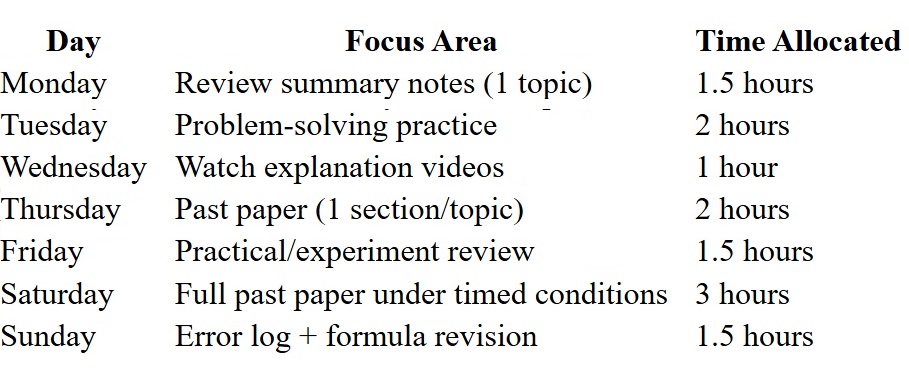
Achieving high marks in A Level Physics is no easy feat, but with the right approach, mindset, and strategies, it is very much possible. Physics at this level requires a combination of conceptual understanding, problem-solving skills, mathematical application, and disciplined study habits. This article explores various techniques and strategies to help students maximize their performance and secure top grades in A Level Physics.
1. Understand the Syllabus Thoroughly
One of the most overlooked aspects of exam preparation is fully understanding the scope and structure of the syllabus. The A Level Physics syllabus is clearly defined by examination boards like Cambridge and IB. Students must:
- Download the syllabus from the official exam board website.
- Highlight all topics and subtopics.
- Note which topics are core and which are optional (if applicable).
- Be familiar with the command words used in the exams (e.g., "describe," "explain," "calculate," "evaluate").
2. Master the Fundamentals First
A Level Physics builds heavily on O Level Physics. If your foundational knowledge is weak, you'll struggle to grasp the more advanced concepts. Core areas to revisit include:
- Newtonian mechanics
- Basic electricity and magnetism
- Waves and sound
- Thermal physics
- Simple atomic structure
3. Prioritize Conceptual Clarity
Unlike rote subjects, Physics demands understanding. Simply memorizing formulas will not suffice -- you must understand how and why they work.
- Use analogies, diagrams, and physical models to grasp abstract concepts.
- Ask "what if" questions to deepen understanding.
- Discuss tricky concepts with teachers or classmates.
- Utilize online platforms like YouTube or Khan Academy for visual explanations.
4. Learn and Practice the Mathematical Tools
Math is the language of physics. A Level students are expected to apply a range of mathematical techniques. Essential skills include:
- Algebraic manipulation
- Solving equations
- Trigonometry
- Calculus (differentiation and integration)
- Graph analysis (slope, area under curves)
5. Practice Past Papers Extensively
Past papers are the single most powerful tool for exam preparation. They allow you to:
- Understand exam patterns
- Familiarize yourself with question phrasing
- Manage time under pressure
- Identify recurring question types
Always mark your answers using official mark schemes and analyze your mistakes for improvement.
6. Make Comprehensive Summary Notes
Creating your own notes is a proven way to reinforce learning. Good notes should be:
- Concise and topic-based
- Contain all key formulas
- Include diagrams and graphs
- Highlight common errors or misconceptions
7. Memorize Key Formulas and Definitions
Although understanding is key, you will need to memorize numerous equations and definitions. Use flashcards, formula sheets, and daily revision to aid memory.
8. Improve Problem-Solving Techniques
Problem-solving is the backbone of Physics. To master this skill:
- Read the question carefully and underline key data
- Sketch diagrams if needed
- Write down knowns and unknowns
- Select and apply appropriate formulas step-by-step
- Check units and significant figures
9. Use Reliable Study Resources
Relying solely on your school textbook may not be enough. Supplement with:
- Reference books (e.g., Nelson Thornes, Cambridge guides)
- Revision guides (e.g., CGP, Hodder Education)
- Online simulations and educational videos
- Apps like PhET and Wolfram Alpha
10. Focus on Practical Skills
Many A Level Physics papers include questions on experiments and data analysis. Be able to:
- Describe and evaluate common experiments
- Identify sources of error and uncertainty
- Interpret graphs and measurements
11. Learn From Your Mistakes
Create an error log where you record each mistake, the correct method, and tips to avoid repeating it. Review this log weekly.
12. Manage Your Time Wisely
Create a structured study timetable that:
- Breaks topics into chunks
- Includes daily/weekly revision
- Schedules past paper practice
- Leaves room for rest and flexibility
13. Practice Writing Clear Explanations
For theory questions, write in clear, scientific language:
- Use correct terminology
- Avoid vague phrasing
- Structure explanations logically
- Refer to physical principles
14. Clarify Doubts Quickly
Never let confusion linger. Ask your teacher, consult reliable online sources, or study with peers to clarify concepts immediately.
15. Stay Motivated and Consistent
Physics success requires steady effort. Stay on track by:
- Setting short-term and long-term goals
- Rewarding yourself for milestones
- Studying with serious peers
- Remembering your reasons for choosing physics
Sample Weekly Study Plan (Final 3 Months)

Conclusion
High achievement in A Level Physics is not just about being "naturally good at science" -- it's about adopting the right methods and maintaining discipline. By focusing on conceptual understanding, practicing problems, reviewing past papers, managing your time, and staying motivated, you can significantly improve your chances of securing a top grade.
Start early, stay consistent, and believe in your ability to improve. A Level Physics is challenging, but with strategic preparation, you can rise to the top of your class and achieve the success you're aiming for.
You can learn these concepts and more at Dr Hock's maths and physics tuition.